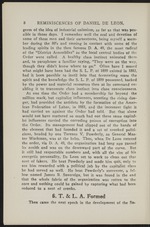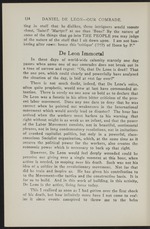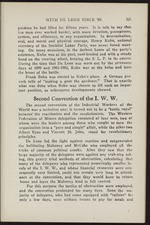| 1 |
 |
“...had provided the antidote by the formation of the Amer-
ican Federation of Labor, in 1881, and the incessant fight it
had carried on against the Order had told. But that alone
would not have mattered so much had not these same capital-
ist influences carried the corroding poison of corruption into
the Order. Its management had slipped out of the hands of
the element that had founded it and a set of crooked politi-
cians, headed by one Terence V. Powderly, as General Mas-
ter Workman, was at the helm. Thus, when De Leon entered
the order, via D. A. 49, the organization had long ago passed
its zenith and was on the downward part of the curve. But
it still had respectable numbers and, with all the vim of his
energetic personality, De Leon set to work to clean out that
nest of fakers. He beat Powderly and made him quit, only to
see him rewarded with a political job by the capitalist clas.s
he had served so well. He beat Powderlys successor, a fel-
low named James R. Sovereign, but it was found...”
|
|
| 2 |
 |
“...over his death. Such was not his
idea of a soldier in the revolutionary movement. Not for that
did he train and inspire us. He has given his contribution to
to the Movementthe tactics and the constructive basis. It is
for us to build. And in this work of building, in this activity,
De Leon is the active, living force today.
This I realized as soon as I had gotten over the first shock
of his death, but how infinitely more have I not come to real-
ize it since events conspired to throw me to the helm...”
|
|
| 3 |
 |
“...In New York, now and then, a fusionist to whom the
S. L. P. seemed to follow a path top narrow would stand up
for more tolerance, broadness, and fusion. Such was Char-
les Sotheran, wlho, being somewhat of a spellbinder, made a
little fuss for a while. Sotheran, however ridiculous this may
sound today, charged De Leon with wanting to establish tac-
tics a la Berlin in the American Socialist movement.
This was by no means a ridiculous charge then, for in
those days Wilhelm Liebknecht was at the helm of the Social
Democracy in Germany. Up to the year 1892 there were only
eleven Social Democrats in the Reichstag. In that year thirty-
six were elected. The Socialist Labor Party of America col-
lected $5,000 within six weeks for the 1892 election campaign
of the German Social Democracy. The party in Germany had
not then voted for war budgets and the Haases* and Scheide-
manns were not yet heard of.
Sotheran had very few to stand for his Populistic fusion
schemes, and he and his and the Socialist...”
|
|
| 4 |
 |
“...more devotion, promptness,
system, and efficiency, in any organization. In determination,
zeal, and moral and physical courage, Henry Kuhn, national
secretary of the Socialist Labor Party, was never found want-
ing. On many occasions, in the darkest hours of the partys
existence, Kuhn was at his post, cool-headed and with a steady
hand on the steering wheel, keeping the S. L. P. to its course.
During the time that De Leon was worn out by the strenuous
days of 1899 and 1901-1902, Kuhn was at the helm and bore
the brunt of the battle.
Frank Bohn was elected in Kuhns place. A German pro-
verb tells of making a goat the gardener. That is exactly
what was done when Bohn was chosen to fill such an impor-
tant position, as subsequent developments showed.
Second Convention of the I. W. W.
The second convention of the Industrial Workers of the
World was a turbulent one; it turned out to be a "battle royal
between' the reactionists and the revolutionists. The Western
Federation of Miners delegation...”
|
|
| 5 |
 |
“...union, the
I. W. W., was treacherously wounded in its vitals by the
scheming politicians wearing the mask of Socialism and hiding
behind a Socialist cloak; and at a time when the masses of
workers were at the crossroads, about to choose whether to
take the road that leads to Revolution and Industrial Democ-
racy or to continue on the road of reform promises and craft
unionism that winds its way to prolonged wage slavery,at
such a time the Socialist Labor Party was in need of strong
men at the helm, men with one purpose alone; to serve the
working class by standing unflinchingly for the principles for
which the party had fought and bled so many years, for an
uncompromising, revolutionary attitude on the political field,
and for a class conscious union on the economic field. The So-
cialist Labor Party needed men at the national headquarters...”
|
|
